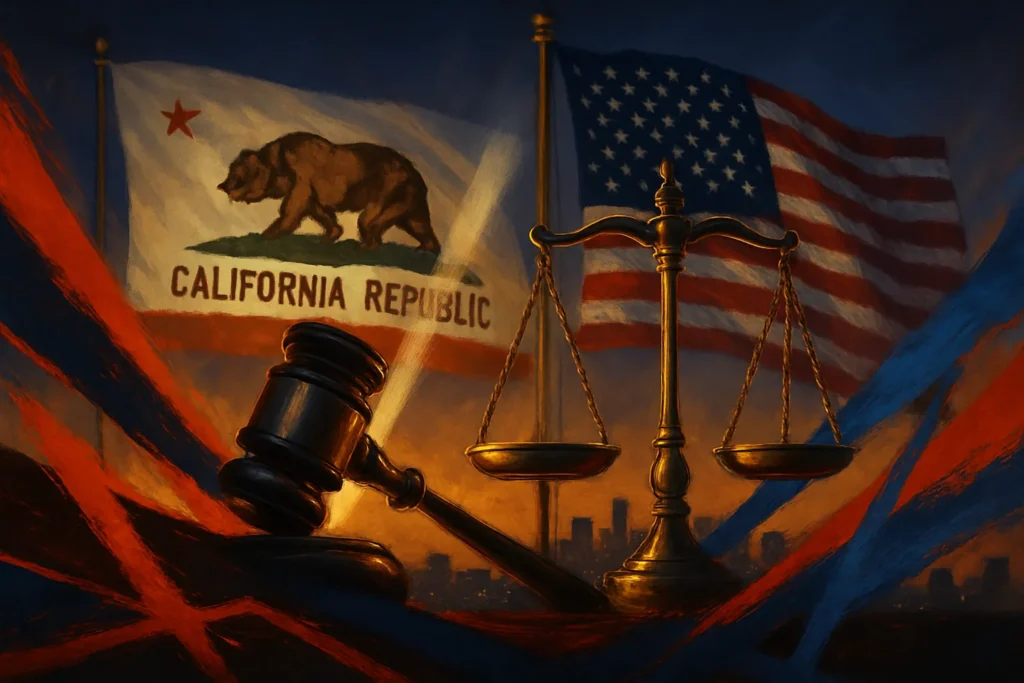Federal Court Rebukes President Trump’s Deployment Order
A recent decision by U.S. District Court Judge Charles R. Breyer marked a critical judicial response to President Donald Trump’s federalization of approximately 4,000 California National Guard troops. In his ruling, Judge Breyer declared Trump’s invocation of emergency powers illegal and unconstitutional, thereby ordering the immediate return of troop control to California’s Governor Gavin Newsom. According to the federal statute cited, 10 U.S.C. Section 12406, the deployment of troops under federal authority requires conditions explicitly aligned with emergencies, such as rebellion or invasion—a threshold that Judge Breyer concluded was not met.
Judge Breyer’s strongly worded ruling challenged the administration’s expansive interpretation of “rebellion,” emphasizing that historical legal definitions dating back to around 1903 consistently characterize rebellion as an extraordinary, rare emergency clearly distinct from more routine civil unrest.
“Rebellion must be understood within its historical legal context—this is not a mere synonym for any violent resistance to law enforcement,” Breyer stated in his decision.
In addition to questioning the President’s statutory authority, the ruling also critiqued the potential escalation of tensions resulting from these deployments. Newsom, echoing these sentiments, described Trump’s deployment as “theater, madness, unconstitutional,” and even raised concerns about the President’s mental acuity.
Temporary Reversal by Appeals Court Complicates Matters
Within hours of Judge Breyer’s landmark decision, however, a three-judge panel of the 9th U.S. Circuit Court of Appeals temporarily blocked the order, allowing President Trump to maintain control of the troops pending further judicial review. This move has temporarily restored federal authority over the California National Guard, thereby making the immediate future of the troops uncertain.
The appeals court’s rapid intervention reflects the intensity and national importance of the legal struggle underway. This judicial back-and-forth occurs amidst ongoing protests in Los Angeles and other cities, sparked by intensified immigration enforcement actions deployed by federal authorities. Homeland Security Secretary Kristi Noem confirmed that despite the legal uncertainties, immigration enforcement actions in the city would continue.
“We remain committed to our enforcement duties,” Noem said, providing a stark contrast to local leadership’s calls for de-escalation.
A significant incident illustrating the charged atmosphere involved California Senator Alex Padilla, who was forcibly removed and handcuffed during a press conference held by Secretary Noem. Padilla had sought to question the administration’s response to the unrest—underscoring deepening tensions between state and federal officials.
The temporary order from the appeals court has set the stage for a pivotal review hearing scheduled next Tuesday, June 17, where arguments will be considered regarding the legality and appropriateness of the National Guard’s continuing operations under federal command. The outcome of this hearing may significantly influence future interpretations of federal versus state control of National Guard deployments.
Historical Context and Policy Implications of Federalizing National Guard Troops
The ongoing situation concerning California’s National Guard marks a crucial point in the recurring debate over federal and state authority, particularly regarding the use of emergency powers. Historically, the National Guard has been activated by both state governors, to respond to localized crises such as natural disasters or civil unrest, and federal government in broader national emergencies. Notably, federal mobilization of the Guard is relatively rare and usually occurs during pronounced events like natural disasters, wars, or significant rebellions.
The intense disagreements across courts about Trump’s federalization orders are reminiscent of past controversies. For example, in 1957, President Eisenhower federalized the Arkansas National Guard to enforce desegregation following the Supreme Court decision Brown v. Board of Education. In that historical instance, the federal action asserted moral imperatives surrounding civil rights, setting a benchmark for the extraordinary nature that should accompany such deployments.
In the current context, however, critics argue Trump’s use of the National Guard reflects neither present historical justifications nor clear statutory authorization. The deployment coinciding with immigration raids and protests in Los Angeles spotlights the politically sensitive intersection between immigration policy enforcement and federal authority. This intersection raises questions regarding long-term implications of such deployments for civil liberties, public safety, and intergovernmental relations.
“Using the National Guard in a hyper-politicized context risks long-term damage to civil-military relations and public trust,” said Dr. Emma Larson, a professor of Constitutional Law at UCLA.
Furthermore, approximately 700 Marines previously dispatched to assist the National Guard and other agencies in Los Angeles have had their deployments cast into further uncertainty by the courts’ decisions. Such military involvement in domestic law enforcement and immigration enforcement efforts is typically restrained legally and politically—both to preserve civil liberties and uphold established norms separating military and domestic police roles.
As the appeals court prepares to revisit the decision, the implications reach beyond immediate operational outcomes. They involve fundamental questions about the interpretation of constitutional limits on executive power, the legal definitions of rebellion, and the federal government’s role in managing civil unrest. The upcoming hearing and subsequent rulings will undoubtedly shape future policy decisions and establish precedents governing the delicate balance between federal authority and state sovereignty in responding to domestic situations.


